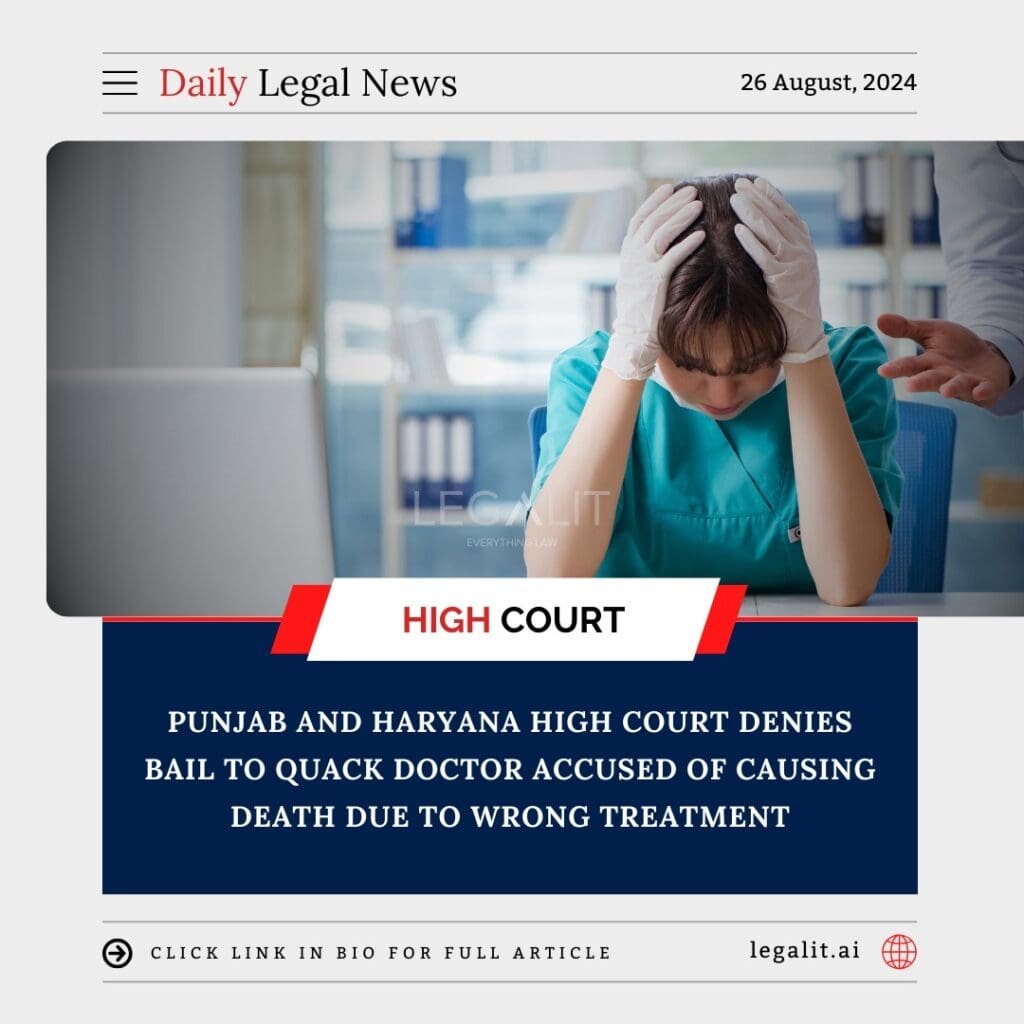
In a critical judgment, the Punjab and Haryana High Court has denied bail to an unlicensed practitioner, often referred to as a “quack doctor,” who is accused of causing a patient’s death through incorrect medical treatment. The court’s decision underscores the serious legal consequences of practicing medicine without proper qualifications and highlights the judiciary’s commitment to safeguarding public health.
Case Overview:
- The Accusation: The accused, who has been practicing medicine without any recognized qualifications, allegedly administered improper treatment to a patient, leading to the patient’s untimely death. The incident triggered widespread outrage, with the victim’s family and the local community demanding strict action against the unqualified practitioner.
- Arrest and Legal Proceedings: Following the patient’s death, law enforcement authorities arrested the accused on charges of culpable homicide not amounting to murder, under the relevant sections of the Indian Penal Code (IPC). The charges were based on allegations that the quack’s negligent and unqualified medical practices directly resulted in the patient’s death.
- Bail Plea: The accused filed a bail application, seeking release on the grounds of personal circumstances and claiming that the death was an unfortunate incident rather than a result of malicious intent. The defense argued that the accused had no prior criminal record and that the incident was a case of medical mishap rather than criminal negligence.
Court’s Ruling:
- Denial of Bail: After considering the arguments from both the prosecution and defense, the Punjab and Haryana High Court denied the bail application. The court emphasized that practicing medicine without the necessary qualifications is a grave offense, and the accused’s actions had serious and irreversible consequences, leading to the loss of a life.
- Public Health and Safety: The court highlighted the critical importance of protecting public health and ensuring that only qualified professionals are allowed to practice medicine. The decision to deny bail reflects the judiciary’s stance that such offenses must be dealt with stringently to deter others from engaging in similar unlawful practices.
- Legal Precedent: The ruling sets a strong legal precedent, reinforcing the idea that unqualified individuals who pose as medical professionals and cause harm to patients will face severe legal consequences. The court’s decision serves as a warning to others who might consider engaging in such illegal practices, emphasizing that the law will not tolerate actions that jeopardize public safety.
Implications of the Judgment:
- Deterrent Against Quackery: The High Court’s refusal to grant bail sends a clear message that quackery—practicing medicine without proper qualifications—will be met with strict legal action. This ruling is likely to act as a deterrent to unlicensed practitioners, emphasizing the severe repercussions of engaging in medical practice without the requisite credentials.
- Protection of Patients: The judgment underscores the judiciary’s role in protecting patients from unqualified medical practitioners. By denying bail, the court has reaffirmed its commitment to upholding public health standards and ensuring that only qualified professionals are entrusted with the responsibility of providing medical care.
- Increased Scrutiny of Medical Practices: In light of this ruling, it is anticipated that there will be increased scrutiny of medical practices, particularly in rural and underserved areas where quack doctors are more prevalent. The judgment may prompt stricter enforcement of medical licensing laws and greater vigilance by health authorities to prevent unqualified individuals from practicing medicine.
Conclusion:
The Punjab and Haryana High Court’s decision to deny bail to the quack doctor accused of causing death due to wrong treatment is a significant step in the fight against unqualified medical practice. By refusing to grant bail, the court has underscored the seriousness of the charges and the potential harm that unqualified practitioners can inflict on unsuspecting patients.
This ruling not only serves as a deterrent to others considering similar unlawful activities but also reinforces the importance of maintaining high standards in the medical profession. As the legal proceedings continue, this case will remain a poignant reminder of the critical need for qualified and competent medical care in ensuring the safety and well-being of patients.